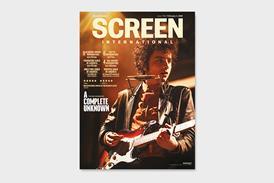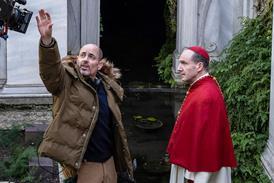As A Field In England prepares for its multi-platform release in the UK, director Ben Wheatley and producer Andrew Starke were in Karlovy Vary to present the film in competition.
Ben Wheatley’s latest film, fully funded by Film4’s digital arm Film4.0, sees the director visit the English Civil War with a tale of battle, alchemy and magic. Surreal, brutal and shot in beautifully stark black and white, the film has all the all the elements for which Wheatley has become renowned for, from the air of dread it manages to conjure up to the vein of the surreal that runs throughout.
So what was it about the English Civil War that appealed to Wheatley?
“It comes from wanting to make something about that point in history. I kind of had a tortuous route to get through – I’d been writing various versions of the script for about 10 years,” explained Wheatley at a press conference at the Karlovy Vary International Film Festival.
“I originally came to it as I’d read a book about Paul Verhoeven and he’d spent time with the Dutch Army, filming them doing beach landings. So he’d managed to shoot stuff that was quite large scale very early on in his career and it helped him with Starship Troopers and stuff like that. So I wanted to shoot something that had massive scale.
“I ended up working with The Sealed Knot [the Civil War re-enactment society] and when I started working with them I read up a bit more on the history and it was really fascinating. It’s the part of history that influences how we’re living in the UK now. I think a lot of the troubles and complications that the characters deal with in my other films start with the Civil War period.”
Risky release plan
The film is due for a groundbreaking release in the UK which will see it released on all platforms – theatrically, on DVD and VOD and on free television – on the same day [today]. Isn’t this something of a risk?
“It sounds counter intuitive. On the face of it people are going ‘If you get something for free, you’ll get it for free instead of paying for it’,” said Wheatley.
“But I don’t think cineastes think like that. I would say the best place to see A Field In England is in the cinema.
“Throughout periods of releasing films with a smaller release, the basic rule of thumb is that it doesn’t matter how good the press and reviews are - if the cinema is too far from people’s houses they won’t go.
“If you’re only on in 10 screens then that’s your audience. That will affect how the DVD sells, because, effectively, no knows about the film. Then you get your biggest audience at the end - and the biggest sales on DVD - when you get shown on TV and a million people see it.
“That’s crazy so we thought we’d turn it upside down and get a million people at the top and see what happens after that.
TV support
“For a movie like ours, the budget is so tiny – like £300,000 – the PR spend is non-existent. But if you’ve got a TV channel behind you, trailing it on TV constantly then you’ve got word of mouth which is the lifeblood of any of the marketing for a movie and that’s the only way we can compete against much bigger movies.
“It’s a slight gamble but I don’t think there’s a massive crossover between the cinema audience and the TV audience. And we had to think about the reality of the release in the UK if we hadn’t done this. It could have been a five-screen release and no one would have seen it.”
Platform partnership
“For us it was about having a partnership across all the release platforms,” said Andy Starke, the producer of A Field In England.
“As a production company making low budget films you need these movies to show promise so everyone can share in the profit. We’ve got a partnership with the cinema, a partnership with the DVD and each of these people are offering their own thing: they don’t compete.
“I would always go to the cinema to see a film but I equally think technology is here, people want stuff on demand. It’s happened; it’s not going to go away.
“But if we can bring ourselves to the point where we are actually in partnership with the delivery of the film, that seems to make a lot more sense rather than paying for the infrastructure of things that don’t actually relate back to the people who actually made the film.
“In the low budget world you’ve got to embrace technology and be clever about it. This is an opportunity to try.”
Wheatley deadpans: “I don’t think it would work for Iron Man 3.”




















No comments yet